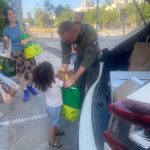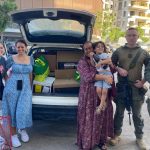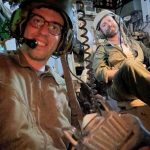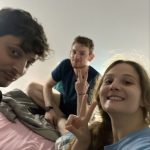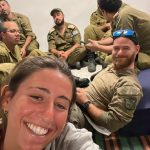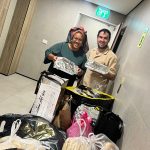JLIC Communities Respond to Operation Rising Lion
The 3:00 AM sirens that pierced the quiet across Israel changed everything. What initially appeared to be an earthquake alert quickly revealed itself as something far more significant—the beginning of Operation Rising Lion, Israel’s response to Iranian aggression that would transform the daily reality for Jewish communities throughout the country.
For JLIC communities across Israel, this moment marked not just the start of a new phase in the ongoing conflict, but the beginning of an extraordinary mobilization effort that would transform how Jewish communities respond to crisis. With five JLIC directors currently serving in the reserves and many community members also called up for military duty, the directors’ wives stepped up to lead alongside the remaining JLIC staff. From Tel Aviv to Jerusalem, from Givat Shmuel to university campuses, this leadership team transformed JLIC communities throughout the country into a network of support and solidarity for those on the front lines.
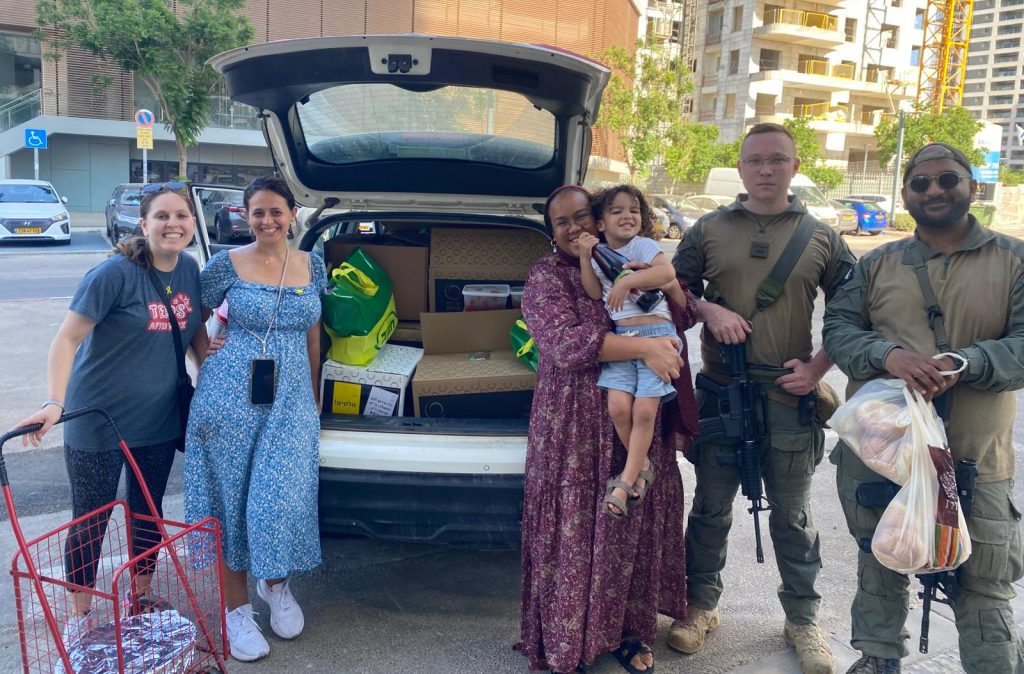
From Safe Rooms to Service
As rockets rained down on central Israel, fundamentally shifting the geography of the conflict, JLIC communities across the country refused to retreat. Instead, they advanced—not with weapons, but with acts of chesed that would touch thousands of lives in the days that followed.
The transformation was immediate and profound. Tel Aviv, once considered safely behind the lines, suddenly found itself at the epicenter of the conflict. Windows shattered, apartments were destroyed, and elderly residents found themselves shell-shocked in neighborhoods that had never experienced such direct impact. It was in this chaos that JLIC communities found their calling.
JLIC communities in Tel Aviv, Givat Shmuel, and Tel Aviv University immediately mobilized to provide ground-level assistance to those affected by the rocket impacts. Their work expanded to encompass not only providing food and supplies to army search and rescue units, but also immediate civilian assistance. They provided essential supplies to a mother sheltering in a hotel with her 11-month-old baby after losing her home. When the vice mayor of Tel Aviv reached out for help in a particularly hard-hit neighborhood populated by elderly residents, community members spent hours going house to house—not just sweeping up glass and helping with insurance forms, but providing the human comfort that only comes from knowing someone cares.
The statistics tell a remarkable story: close to 1,000 soldiers across the country received Shabbat candles, grape juice, and food. Each kiddush and hamotzie these soldiers made was enabled by the chesed of young Jews who understood their role in supporting those who protect Israel. Beyond these Shabbat provisions, the assistance took countless forms—community members arranged transportation for soldiers across the country, connected families of deployed reservists with childcare help, and provided halachic guidance for communities grappling with Shabbat observance under fire.
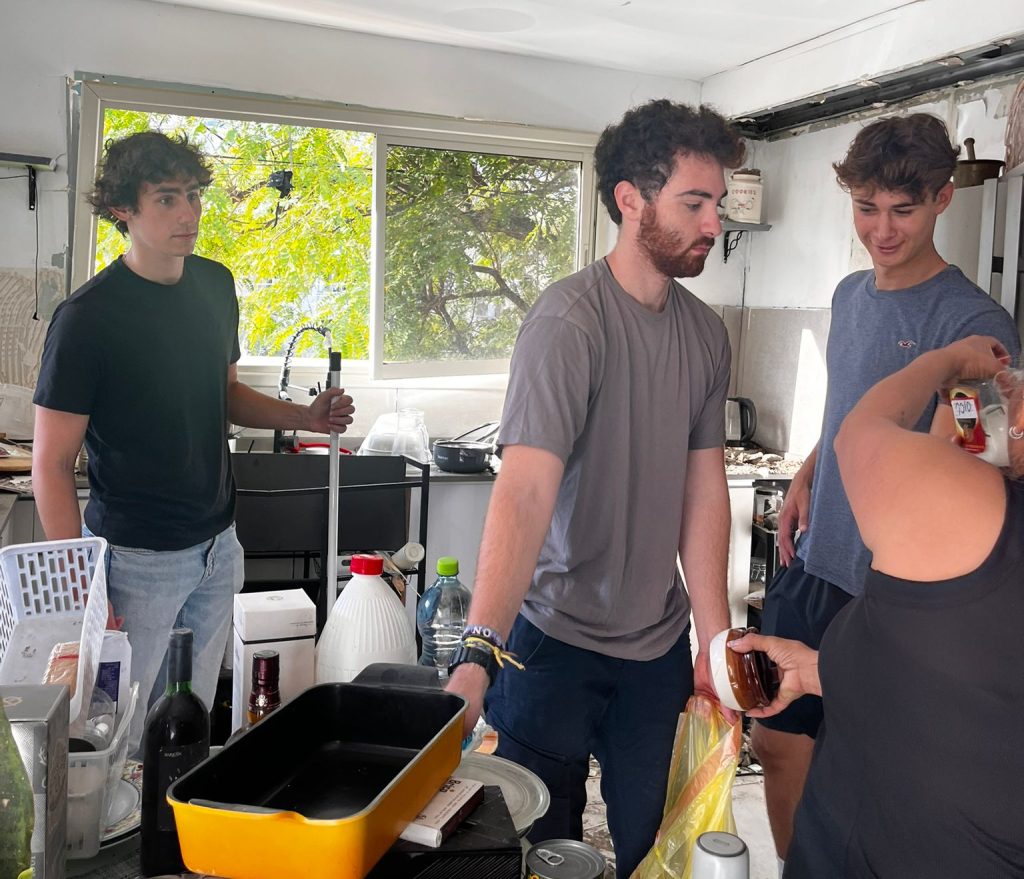
Breaking Barriers, Building Bridges
Perhaps one of the most moving moments came when a Druze friend, responsible for several hundred soldiers deployed throughout central Israel, reached out to Rabbi Wolfson from JLIC Tel Aviv for help preparing Shabbat supplies. The request sent “a little special shiver” through the rabbi—a non-Jewish Druze commander calling his Orthodox rabbi friend to help ensure his soldiers could properly observe Shabbat.
The community mobilized immediately, with members purchasing and delivering supplies across neighborhoods in Bnei Brak, Holon, Tel Aviv, and Givatayim. This was just the beginning. Similar requests flowed in from the Home Front Command in Ramla and female search and rescue units in Lod. A local Tel Aviv synagogue, Yakar, opened their kitchen, and the community established a systematic approach—creating forms for units to request help, collecting donations, and coordinating the preparation and delivery of hundreds, then thousands of meals.
The geographic scope of their work told the story of how the conflict had evolved. These weren’t traditional war zones—they were the everyday places where Israelis lived and worked, now suddenly on the front lines. The soldiers they served weren’t just defending distant borders; they were pulling people from rubble in the heart of Israel’s most populated areas.
Learning Never Stops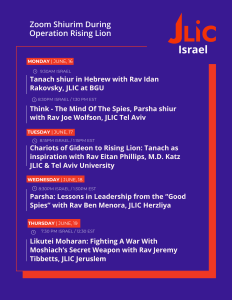
Even as communities mobilized for emergency response, JLIC’s educational mission continued uninterrupted. Recognizing that learning and spiritual growth remain essential even—or especially—during times of crisis, programs seamlessly transitioned from in-person gatherings to Zoom shiurim.
The schedule of Torah learning continued with remarkable consistency: Rabbi Idan Rakovsky led Tanach shiur sessions, Rabbi Joe Wolfson taught “Think – The Mind of the Spies” focused on Parshat Shelach, Rabbi Eitan Phillips explored themes from “Chariots of Gideon to Rising Lion,” Rabbi Ben Menora examined “Lessons in Leadership from the ‘Good Spies'” in his Parsha shiur, and Rabbi Jeremy Tibbetts delivered sessions on “Likutei Moharan: Fighting A War With Moshiach’s Secret Weapon.”
This adaptation demonstrated a core JLIC principle—that Jewish learning and community building don’t pause for external circumstances. Students and community members who might have been physically separated by security concerns remained intellectually and spiritually connected through these virtual study sessions.
A Network of Support
The impact extended far beyond Israel’s borders. When Jewish students found themselves stranded in places like Rome, the network mobilized to help them reach safety for Shabbat. Meanwhile, on campuses across the United States and Canada, JLIC communities organized prayer services and Tehilim recitation, ensuring that support for Israel extended across continents and time zones.
Unity from Crisis
Perhaps most remarkably, the crisis revealed and strengthened bonds across Israeli society that transcended traditional divisions. In a powerful reversal of roles, Kibbutz Nir Am—themselves previous evacuees from October 7th—reached out to offer shelter to those fleeing the rocket fire in central Israel.
As Rabbi Wolfson reflected, this represented something profound about Israeli society. The relationships and friendships forged through shared struggle were now providing the foundation for mutual support across different regions and communities. Those who had been welcomed as guests after October 7th were now saying, “Please, you return to us.”
The rabbi chose to frame this not as mere evacuation, but in the tradition of Abraham and Sarah—the sacred act of welcoming guests. In doing so, he identified something essential about how Jewish communities respond to crisis: not just with practical assistance, but with the recognition that caring for others is itself a form of worship.
The Ongoing Mission
As Operation Rising Lion continues, JLIC communities demonstrate that their response to crisis isn’t temporary mobilization, but rather an intensification of their ongoing mission. The same networks that had supported those fleeing Hamas rockets in the south after October 7th now serve their own communities as the geography of danger shifted.
The work continues, supported by donations that immediately transform into meals, supplies, and comfort for those on the front lines. Units that received JLIC support reported using that sustenance just hours later while rescuing people from shattered homes—a reminder that every act of chesed during wartime directly enables the preservation of life.
From the safe rooms of Tel Aviv to the Zoom screens connecting students across continents, JLIC communities prove that when sirens sound, the Jewish response isn’t to freeze in fear, but to surge forward in service. In doing so, they embody the very unity and resilience that Operation Rising Lion seeks to defend.
The story of JLIC during Operation Rising Lion isn’t just about crisis response—it’s about how Jewish communities transform challenge into purpose, isolation into connection, and fear into the kind of courage that shows up with a home-cooked meal and the simple declaration: “We’re here for you.”
Reach out to any of our Directors to learn more about and to support JLIC and our programming.
Related Post
JLIC Tel Aviv Delivered Shabbat Meals to IDF Soldiers in Syria
Lights in the Darkness II: A Night of Community, Resilience, and Hope
Bringing Joy to Those in Need: JLIC Tel Aviv’s Matanot L’Evyonim 2024
A Heartwarming Initiative Connecting Small Businesses and Military Families

